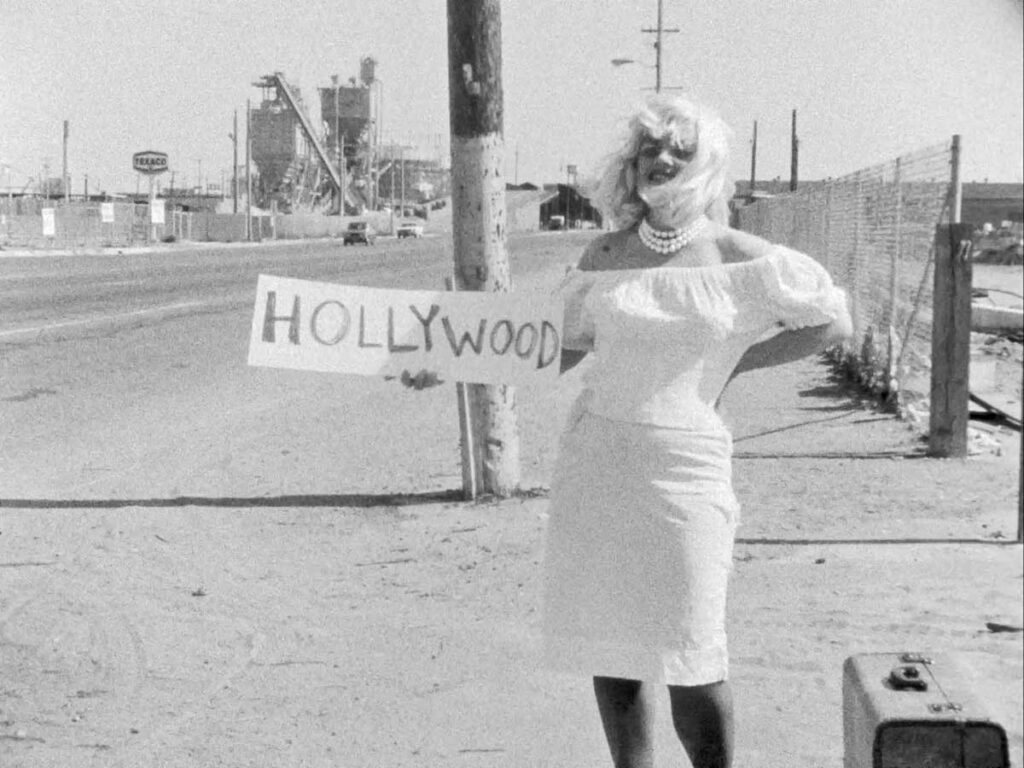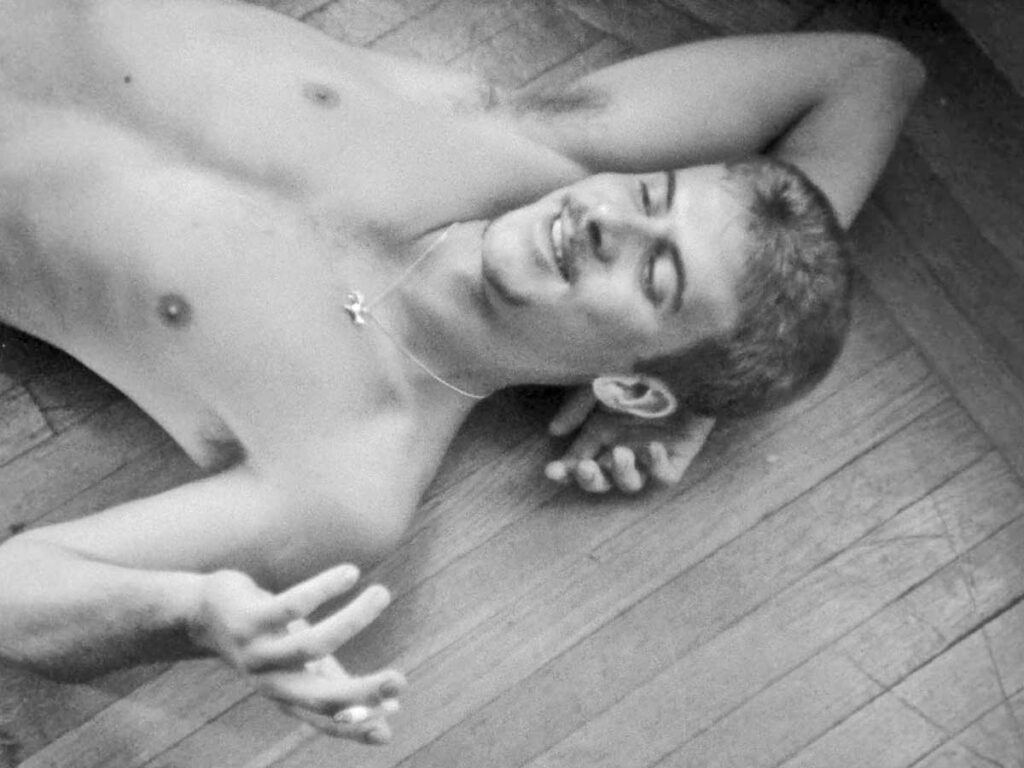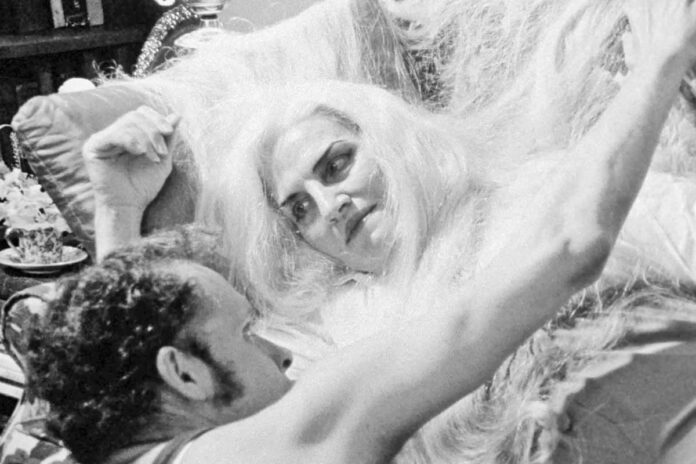On March 19, the Lightbox Film Center is projecting two programs of restored short films by the late, great, gay underground filmmaker, Curt McDowell, back-to-back. The shorts, which range from 2 minutes to nearly an hour in length, provide a nifty showcase for this cheeky, underground filmmaker who shot grainy, black-and-white, no-budget movies with a stock company of friends, including George Kuchar, who was first his teacher and later his lover. (McDowell died from AIDS in 1987.)
Program 1, which screens at 5:00 pm, features five shorts, all made in 1972. “Ainslie Trailer” is an amusing theater advertisement that introduces Ainslie Pryor, who appears in several of McDowell’s shorts, including “Wieners and Buns, The Musical,” a delightfully absurdist short about a married couple (Pryor and Kuchar) who are both secretly in love with the same man (McDowell), who harbors a terrible secret himself.
Two other shorts in Program 1 are “Truth for Ruth,” in which McDowell recounts an idea he had for a film about a young woman who wakes up on the beach and is searching for something — or someone. The 3-minute short comes to an unexpected “climax.” McDowell’s short, “Ronnie,” is a portrait of a handsome young man who is seen in various stages of undress, recounting his experience as a hustler in San Francisco. McDowell shoots Ronnie lovingly, filming his naked body in various artistic poses as his monologue unfolds.

But the highlight of Program 1 is “Peed Into the Wind,” McDowell’s hour long melodrama about various characters who admire (fictional) singer Mick Terrific (McDowell). The story has Frank dumping his girlfriend Margie for Millie. However, Millie is obsessed with Mick Terrific. Unfortunately, Mick is queer, and while he is described by one friend as “a latent heterosexual” — because Mick has relationships with women — he is not interested in Millie. In fact, Mick is off searching for “Mr. Right,” tracking down various guys he hopes to bed, but Millie haunts him. Meanwhile, a subplot has Goldy Gerr (Kit Carson) searching for Mick and encountering some very horny men in the process.
McDowell does not shy away from presenting full frontal nudity in his work. The opening moments feature Mick crooning the title tune as Frank does, in fact, pee into the wind. There are other more explicit moments, such as an inexplicable scene involving a character gratifying himself, while one dream-like sequence features a man tormenting Millie with a chicken leg (and thigh) acting as a makeshift penis.
“Peed Into the Wind” features campy humor and offbeat situations, and McDowell delights in all of it. He is obviously having great fun here, and he invites discerning audiences to do the same. His shorts may feel quaint and amateurish, but they are indicative of the independent underground spirit of the time and the heyday of sexual revolution and liberation.

Program 2, which screens at 8:00 pm, also features five shorts which were made between 1972 and 1981.
“Kathleen Trailer,” like “Ainslie Trailer,” is a 2-minute theater promotional short, this time featuring Kathleen Hohalek. She encourages folks to come to the midnight movie. The amusing short, “A Night with Gilda Peck,” also features Hohalek playing a society lady who lives in a penthouse apartment. When her maid (Ainslie Pryor) conspires to rob her, all hell — and a musical number breaks out. “The Mean Brothers Get Stood Up” is also a musical; the title characters (Mark Ellinger and McDowell) bemoan in song, about their dates not arriving at the appointed time.
While these shorts are fun, they feel more like sketches. The 20-minute “Beaver Fever” is more complex. Goldenrod (Melinda McDowell, Curt’s sister) is hoping to connect with her boyfriend Hunk (George Kuchar), but he’s busy having a threesome with a man (Hopeton Morris) and a woman (Donna Kerness) known as “the River Rats.” When Goldenrod heads off to meet Hunk, she is intercepted by the River Rats. Meanwhile, Hunk goes over to Goldenrod’s and encounters Aunt Ruth (Ruby B. Davis). Will true love win out? Perhaps.
The program concludes with “Taboo (The Single and the LP)” a 50-minute non-narrative film that features various characters and storylines loosely connected by some cryptic bathroom graffiti. There are scenes of voyeurism, homoeroticism, and sex. Characters play board games like “Fat Boy” and “Let’s Furnish a House,” while two young men play strip poker.
The film unspools like a fugue and different episodes having different moments of interest. The most intriguing sections are the documentary ones involving McDowell (off screen) interviewing a handsome young straight guy, Fahed Martha, about his life. Martha poses in skimpy underwear at one point, and McDowell juxtaposes this with a montage of bodybuilders. Martha is also seen tied up in a shower at various times throughout “Taboo,” but there is no explanation for how or why he got there. McDowell just objectifies and fetishizes him.
And a warning: “Taboo” ends with a disturbing sequence that seems apropos of nothing that has proceeded it. But it is an experimental film, after all.
Even if the program features a shocking ending, McDowell’s stimulating mix of sex, music, and queer humor provides a terrific introduction to viewers unfamiliar with this iconoclast filmmaker’s unique brand of underground cinema.
For more information on the programs, visit: https://lightboxfilmcenter.org/.

